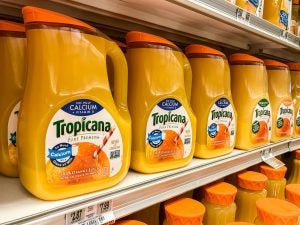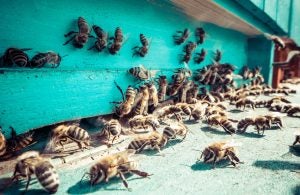Much of the Florida is working to recover from Hurricane Ian, but the agricultural industry is just beginning to tally up the full magnitude of the destruction the storm left in its wake in September. Ian hit the state’s cattle industry, dairy operations, vegetables, bees, and more. Citrus alone, accounts for an almost $7 billion economic impact, and now, the Orange State’s production may be the lowest harvest since 1943 — during World War II.
Florida, now in its four-year annual decline has been surpassed by California in orange production. But, it’s not just the hurricane that’s been hurting Florida’s citrus, it is citrus greening too. The state will produce 28 million boxes for the current season, down 32 percent from last year, according to the U.S. Department of Agriculture’s recent report.
So, orange juice is about to get more expensive.

»Related: Here’s how to help those affected by Hurricane Ian
“Hurricane Ian hit Florida citrus growers on many levels — their groves, their homes, their communities –- all in the path of destruction,” said Shannon Shepp, Executive Director of the Florida Department of Citrus. “Growers approached this season with optimism for good reason. Innovations in greening therapies and the discovery of trees that show signs of natural resistance and tolerance to the disease are teed up for deployment. The hurricane is a setback, for sure, but we’ve done this before. We’ll have a lot of help, we know that. On the other side of storm recovery is an industry ready to take a clear set of new tools and do what they really want to do — rebuild, recover from greening.”
“If you eat, you’re part of agriculture,” Petteway, a fifth-generation Floridian, said during a tour of his groves. “We were anticipating a very good crop this year. Sadly, there’s nothing we can do about it. It’s just a devastating thing.” Petteway described the estimated 40 percent crop loss and destruction of his 100-acre grove to The Associated Press, saying that he’ll be evaluating damages for the next six months.
Florida Agriculture Commissioner Nikki Fried offered the following statement, “It is heartbreaking to see such an iconic Florida industry hurting right now. This year will be tough, no one is disputing that, but I believe in the tenacity and passion of our citrus industry professionals to come back stronger than ever.”
The University of Florida has also released reports on the impacts of Hurricane Ian on honey bees. Florida is the fourth-largest producer of honey in the nation, according to the USDA. There are over 5,000 registered beekeepers in the state, managing about 700,000 colonies. An estimated 380,000 colonies were in the path of Hurricane Ian and have lost a significant part of their operation including equipment, infrastructure, honey houses, and equipment storages.

According to the University of Florida, “If a hive is completely submerged in floodwater, all the bees in it will die, and the equipment — such as the frames, hive bodies and even the honeycomb — can be damaged or destroyed. If floodwaters are high enough to block the entrance of a beehive, the bees cannot escape, and this can also lead to the colony drowning.”
»Related: Hurricane Ian’s rain a positive for Virginia farmland

